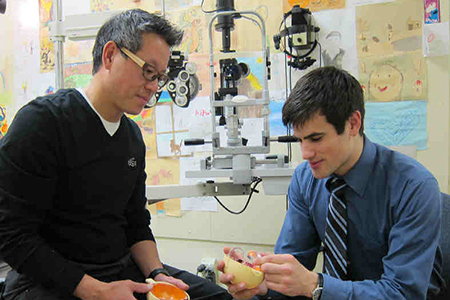IF YOU SPENT YOUR CHILDHOOD looking at bugs under magnifying glasses or if you are fascinated by the possibilities in a Punnett square or if your bio lab is the highlight of your week then you might consider a life devoted to the life sciences. Biology is an incredibly diverse field—as diverse as life itself because that’s what it’s all about: Life. From microscopic one-celled organisms to massive whales biologists train their eyes on how organisms grow act react and evolve. Biologists learn new things all the time ensuring that this is a field that will always stay exciting.
However your job title need not be “biologist” to enjoy a career in life sciences. Start with a major in biology and an amazing number of career paths are possible. Here are 10.
1. AQUARIST/ZOOKEEPER
Take care of the creatures living in an aquarium or zoo by giving them great living spaces monitoring their health and managing their diets.
2. BIOINFORMATICS SPECIALIST
In this high-tech field you’ll develop and run computer applications to help answer biological questions such as comparing gene sequences across species or organizing data about the behavior of various proteins.
3. EPIDEMIOLOGIST
How and where did a disease outbreak start? Where has it spread? And why? These are just a few of the big public health questions that epidemiologists or “disease detectives” answer every day.
4. FORENSIC BIOLOGIST
Help solve mysteries and crimes by examining hair blood tissue bones plant and animal remains and insects. Your lab results could be just the evidence investigators need to find their answers.
5. HORTICULTURIST
Horticulturists are plant experts. These scientists might figure out the best way to cultivate plants or grow crops. Some may even create new types of plants. Others create beautiful landscape designs.
6. MARINE BIOLOGIST
A marine biologist is a zoologist who specializes in the study of ocean-based life whether that’s a sea sponge or a blue whale.
7. MEDICAL ARTIST
If you love art as much as you love biology put those pens and paint (or a computer) to work for you by preparing illustrations for medical texts.
8. PARK RANGER
Rangers keep public open spaces safe and healthy. They manage what grows in the park monitor the park for hazards such as fires respond to emergencies help wildlife and educate park visitors about the natural wonders around them.
9. PHYSICIAN ASSISTANT
Want to provide medical care but not sure you want to devote years to medical school and be on call 24/7? Physician assistants or PAs provide primary and emergency health care to people under the supervision of a physician. This is a high-demand field!
10. SCIENCE REPORTER
Use your sparkling writing skills to report and write about newsworthy discoveries and ideas from the world of science.
Along with your biology major a great way to prepare for a career in life sciences is to make sure you take plenty of coursework in communication—both writing and speaking. Just about every job in the sciences requires you to explain your work to other people to instruct others or to make requests for resources in writing. So your communication skills need to be as finely honed as your scientific skills.



